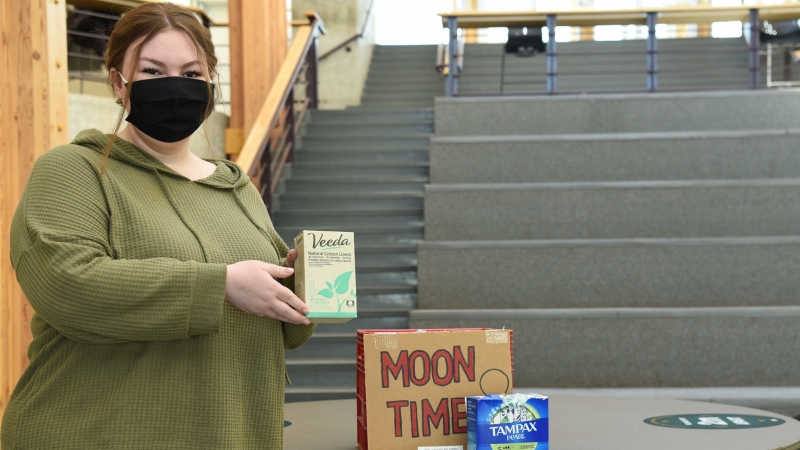Free menstrual products coming to UNBC campus
Led by a group of committed students, UNBC is taking steps to end period poverty by installing menstrual product dispensers in high-traffic washrooms.

Beginning this fall, students and other members of the University of Northern British Columbia community will have access to free menstrual products in select washrooms at the Prince George campus.
Inspired by the United Way’s Period Promise campaign, a consortium of campus groups came together to develop a pilot project that will see menstrual product dispensers installed in high-traffic washrooms. The University is providing funding to get the project started.
“We want to bring menstrual products to campus and make them available free-of-charge for students and other people who access the University who are menstruating to end period poverty and end the stigma they may be experiencing,” explains Emily Erickson, a third-year Social Work student who is currently completing a practicum at the Northern Women’s Centre. “Period poverty is something menstruating people experience when they don’t have the proper tools, such as menstruation products, to manage their periods.”
The cost of purchasing menstrual products is expensive. Some people must either choose to forgo other essential items to purchase menstrual products or choose not to attend campus when they are menstruating.
“We don’t want people to have to choose between coming to class or staying home because they don’t have proper products to make their day comfortable and sanitary,” Erickson says. “Everyone has the right to feel clean and comfortable.”
Campus groups including the Northern British Columbia Graduate Students’ Society (NBCGSS), the Northern Undergraduate Student Society, the Prince George Public Interest Research Group and the Northern Women’s Centre spearheaded the project.
“We provide toilet paper for free in public and private washrooms to address the basic human right of access to proper sanitation,” says Abby Dooks, Director of External Affairs for the NBCGSS. “Women and people who menstruate make up 51 per cent of Canada’s population. This program will provide free menstrual products to meet this basic need for half the population.”
They are now working to identify which washrooms will have dispensers and where in the washrooms they will be placed.
“There should not be any barriers to accessing menstrual products and I am committed to working with our UNBC community to reduce those challenges,” says UNBC President and Vice-Chancellor (Interim) Dr. Geoff Payne. “Thank you to the students and other campus leaders who came together to make this pilot project a reality and for their continued efforts to end period poverty and eliminate menstrual stigma.”
The new dispensers build on the work the Northern Women’s Centre has done to make menstrual products available. For years, the centre has provided supplies, including tampons, pads and diapers, to those who requested them. The new dispensers will allow even more people who menstruate to access the products.
Northern Women’s Centre Executive Director Sarah Boyd says the new program dovetails with their existing educational campaigns, which include teaching students how to make cotton menstrual pads and providing information on other eco-friendly options.
“Education around the menstrual cycle and trying to remove the stigma around menstruation is so important,” Boyd says. “I think the Period Promise program will give us a new springboard to do more education in that realm.”
The pilot project will keep UNBC’s environmental mission in mind as well. Erickson says they will be choosing products that use little or no plastic in their packaging.
“We want to enhance our reputation as Canada’s Green University by providing products that can break down in the environment,” she says.
Helping to launch the pilot project was part of Erickson’s practicum. Working with Boyd, she learned how to research and draft a funding proposal and what factors to consider when sourcing products. She also enhanced her ability to advocate for an important cause.
“The skills I learned and the knowledge I gained during the process will help me in my career as a social worker,” she says. “It will also help me support other causes and issues I believe in.”
UNBC is an early adopter in the post-secondary sector and organizers hope other colleges and universities in B.C. and beyond will join in.
“We want to inspire other universities to consider launching similar projects,” Erickson says. “We hope this catches on because it will be better for students across Canada.”
